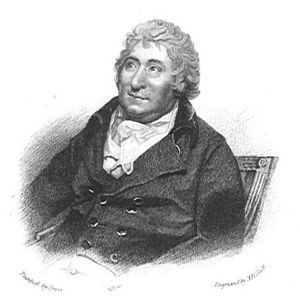Annotation:Harlequin Neptune: Difference between revisions
No edit summary |
No edit summary |
||
| Line 1: | Line 1: | ||
'''Back to [[{{BASEPAGENAME}}]]''' | =='''Back to [[{{BASEPAGENAME}}]]'''== | ||
---- | ---- | ||
<p><font face="garamond, serif" size="4"> | <p><font face="garamond, serif" size="4"> | ||
| Line 5: | Line 5: | ||
<br> | <br> | ||
<br> | <br> | ||
'''Harlequin Neptune''' was a 1775 stage | [[File:dibdin.jpg|300px|thumb|right|Charles Dibdin]] | ||
[ | '''King of the genii: or, Harlequin Neptune''' was a 1775 stage pantomime, "with music and dancing" by English composer Charles Dibdin (1745-1814). It was one of many such productions in which the character of Harlequin is the protagonist, playing alongside another stock character, the clown. There were so many comic stage plays written for Harlequin that they form their own genre, Harliquinades [https://en.wikipedia.org/wiki/Harlequinade]<br> | ||
<br> | <br> | ||
<br> | <br> | ||
| Line 26: | Line 26: | ||
<br> | <br> | ||
---- | ---- | ||
'''Back to [[{{BASEPAGENAME}}]]''' | =='''Back to [[{{BASEPAGENAME}}]]'''== | ||
Revision as of 02:20, 20 June 2016
Back to Harlequin Neptune
HARLEQUIN NEPTUNE. English, Country Dance Tune (4/4 time). D Major. Standard tuning (fiddle). AABB. In addition to the printing by London publishers Samuel, Ann and Peter Thompson in their Twenty-Four Country Dances for the Year 1781, the tune appeared in Longman, Lukey & Broderip's Bride's Favorite Collection of Two Hundred Select Country Dances (London, 1775, p. 89).

King of the genii: or, Harlequin Neptune was a 1775 stage pantomime, "with music and dancing" by English composer Charles Dibdin (1745-1814). It was one of many such productions in which the character of Harlequin is the protagonist, playing alongside another stock character, the clown. There were so many comic stage plays written for Harlequin that they form their own genre, Harliquinades [1]
Source for notated version:
Printed sources: Thompson (Compleat Collection of 200 Favourite Country Dances, vol. 5), 1788; No. 178, p. 87.
Recorded sources:
